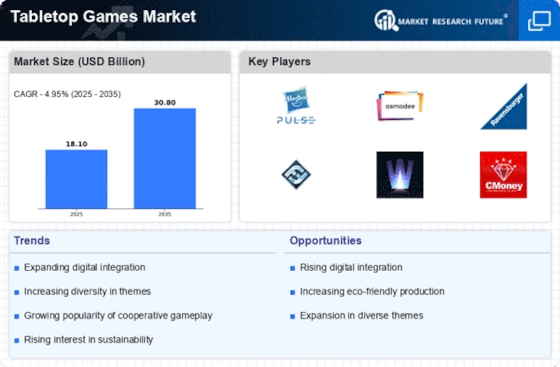Top Industry Leaders in the Table Top Games Market

The table-top games market, a vibrant segment within the entertainment and leisure industry, has experienced significant growth as people seek engaging and social activities. As of 2023, key players in this market have strategically positioned themselves to cater to the diverse preferences of consumers, offering an array of table-top games that range from classic board games to modern strategy and party games.
Key Players:
Hasbro Inc.
Asmodee
Mattel, Inc.
Ravensburger AG
Goliath B.V.
Grand Prix International
Buffalo Games
Grand Prix International
Lifestyle Boardgames Ltd.
Korea Boardgames, Co., Ltd
Strategies Adopted:
The table-top games market deploy various strategies to maintain and enhance their market positions. Product diversification is a common approach, with brands continuously introducing new games and expanding their portfolios to cater to different interests and age groups. Licensing agreements and collaborations with popular franchises or intellectual properties are utilized to create themed versions of classic games, enhancing brand visibility. Marketing strategies include promotional events, partnerships with influencers, and social media campaigns to engage with the gaming community. Pricing strategies vary, with some brands offering budget-friendly options targeting mass consumers, while others focus on premium, collector's editions for enthusiasts. Distribution strategies encompass traditional retail channels, online platforms, and partnerships with local game stores to ensure broad accessibility.
Market Share Analysis:
The table-top games industry involves evaluating several factors. Brand recognition and heritage play a crucial role, with consumers often gravitating toward well-known and trusted names in the industry. The ability to offer a diverse range of games catering to different preferences, from strategy enthusiasts to casual family gamers, contributes to market share growth. Pricing competitiveness, promotional activities, and product availability in various retail outlets impact market share dynamics. Quality of game components, including design, durability, and innovative features, influences consumer satisfaction and brand loyalty. Positive reviews and recommendations from gaming communities also play a role in shaping brand perception and influencing market share within the highly competitive landscape.
News & Emerging Companies:
The table-top games market has witnessed the emergence of new and independent game publishers focusing on unique and innovative game designs. Emerging companies often leverage crowdfunding platforms, such as Kickstarter, to fund and promote their games directly to consumers. News in this industry typically revolves around successful Kickstarter campaigns, awards won at gaming conventions, and efforts to bring fresh and diverse voices to the table-top gaming community.
Industry Trends:
The table-top games market often highlights trends in innovation, inclusivity, and the rising popularity of hybrid digital and physical gaming experiences. Companies are increasingly investing in game design talent, exploring innovative gameplay mechanics, and adopting sustainable packaging practices to meet consumer expectations for eco-friendly gaming products. Current investment trends reveal a focus on technology, with brands incorporating digital components into their games, such as companion apps or augmented reality features. Additionally, investments in research and development aim to create immersive and engaging gaming experiences that align with evolving consumer preferences for unique and memorable tabletop encounters.
Competitive Scenario:
The table-top games market is characterized by a mix of established game publishers with a long history and diverse portfolios, as well as emerging indie developers contributing to the industry's creativity and innovation. Established brands leverage their extensive experience, global reach, and licensing capabilities to provide consumers with a broad array of table-top games, often supported by strong marketing campaigns. Emerging brands, on the other hand, focus on niche markets, unique game mechanics, and direct engagement with their community to differentiate themselves in the competitive landscape.
The advent of digital platforms and online communities has significantly impacted the competitive landscape, allowing both established and emerging brands to engage directly with consumers, provide digital adaptations of their games, and gain valuable feedback for future releases. Brands that effectively utilize digital marketing, build engaging online communities, and adapt to the changing dynamics of both physical and digital gaming are better positioned to succeed in this evolving market.
Recent Development
The table-top games market experienced a notable development as Asmodee Group announced a strategic partnership with a prominent video game studio to create digital adaptations of their popular board games. This move reflected Asmodee's commitment to expanding its presence in the digital gaming space while maintaining the essence of their well-loved table-top titles. The collaboration aimed to bridge the gap between traditional and digital gaming experiences, catering to a broader audience and addressing the growing trend of hybrid gaming. Asmodee's investment in digital adaptations underscored the industry's recognition of the evolving preferences of gamers for multi-platform experiences that complement their table-top enjoyment.











